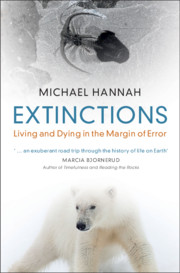
-
Select format
-
- Publisher:
- Cambridge University Press
- Publication date:
- 01 September 2021
- 16 September 2021
- ISBN:
- 9781108919012
- 9781108843539
- Dimensions:
- (229 x 152 mm)
- Weight & Pages:
- 0.52kg, 262 Pages
- Dimensions:
- Weight & Pages:
You may already have access via personal or institutional login
Book description
Are we now entering a mass extinction event? What can mass extinctions in Earth's history tell us about the Anthropocene? What do mass extinction events look like and how does life on Earth recover from them? The fossil record reveals periods when biodiversity exploded, and short intervals when much of life was wiped out in mass extinction events. In comparison with these ancient events, today's biotic crisis hasn't (yet) reached the level of extinction to be called a mass extinction. But we are certainly in crisis, and current parallels with ancient mass extinction events are profound and deeply worrying. Humanity's actions are applying the same sorts of pressures - on similar scales - that in the past pushed the Earth system out of equilibrium and triggered mass extinction events. Analysis of the fossil record suggests that we still have some time to avert this disaster: but we must act now.
Awards
Winner, 2022 Choice Outstanding Academic Titles
Reviews
‘… a useful and succinct summary of the research into the reality and timing of mass extinctions from the early concepts to recent research - it brought me up-to-date with current thinking on mass extinctions. I admire his ‘sceptical’ stance: attempting to discriminate what a mass extinction actually is - outside the biggest three - is not as easy as has been assumed. The mass extinctions of the past clearly have relevance to the current approaching catastrophe in the Anthropocene, and the careful appraisal of exactly where we are in comparison with previous extinctions will be of great concern to those interested in the ‘long view’. I particularly appreciated the focus on the notion of the interconnectedness of Earth systems.’
Richard Fortey - author of Life: An Unauthorised Biography History and Trilobite: Eyewitness to Evolution
‘Despite its somber title and topic, Extinctions is an exuberant road trip through the history of life on Earth, led by a friendly and knowledgeable guide who knows all the locals along the way. Visiting so many ancestral Earthlings and vanished ecosystems is heady - and deeply humbling.’
Marcia Bjornerud - Lawrence University, author of Timefulness and Reading the Rocks
‘Most of life may well be extinct, because of the huge age of the Earth, but Michael Hannah shows vividly in this book that the 8.7 million species on Earth today are profoundly at risk; the lessons of the fossil record tell us what will surely happen if we continue pushing species after species to the brink.’
Michael Benton - University of Bristol, author of Dinosaurs Rediscovered
‘Without death, there can be no change. And, as Michael Hannah makes clear in his engaging new book, mass extinctions on various scales have been key shapers of the world as we know it. Had the dinosaurs not abruptly disappeared, we humans would not be here today. But as Hannah also shows, there is something dreadfully menacing about the massive species loss and climate change the world is currently experiencing, making his book a balanced yet deeply unsettling account of what humans are unwittingly doing to the world.’
Ian Tattersall - American Museum of Natural History, co-author of The Accidental Homo sapiens
‘An accessible and authoritative guide to the past, present, and future of extinctions. Michael Hannah dives into the fossil record and surveys the great mass extinctions of Earth history, from the death of the dinosaurs to the demise of the woolly mammoth, and explains how they are relevant to understanding the predicament we are in today, and to plotting a better future.'
Steve Brusatte - University of Edinburgh and New York Times/Sunday Times bestselling author of The Rise and Fall of the Dinosaurs
‘Michael Hannah's book expertly examines the geological record of mass extinction events. It asks us to consider whether we wish to join asteroid strikes and massive volcanic eruptions as causes of mass extinction. Or whether we can change our relationships with the wonderful diversity of life around us to avoid such an ignominious outcome.’
Mark Williams - University of Leicester
‘… measured, thought-provoking analysis.’
Andrew Robinson Source: Nature
‘Hannah's conclusion seems to whisper of impending disaster, delivering a highly effective 'Yikes!' moment. This book offers a very readable description of known extinctions for anyone interested in past life. At the same time, it seems to have all the elements of a new literary genre: scientific nonfiction - science noire. The final paragraphs are written as if there will be no sequel … Highly recommended.’
M. S. Zavada Source: Choice
‘Accessible overviews that synthesise wider patterns and processes of extinction are still surprisingly thin on the ground, and so Hannah’s contribution is to be welcomed.’
Samuel Turvey Source: The Holocene
‘Despite the sobering topic, Hannah’s storytelling is exceedingly pleasant and never feels dry or moralizing. Overall, ‘Extinctions’ offers the reader a fascinating perspective on biodiversity losses and a renewed sense of urgency regarding the ongoing biodiversity crisis.’
Nora Haack Source: Community Ecology
Contents
Metrics
Altmetric attention score
Full text views
Full text views help Loading metrics...
Loading metrics...
* Views captured on Cambridge Core between #date#. This data will be updated every 24 hours.
Usage data cannot currently be displayed.
Accessibility standard: Unknown
Why this information is here
This section outlines the accessibility features of this content - including support for screen readers, full keyboard navigation and high-contrast display options. This may not be relevant for you.
Accessibility Information
Accessibility compliance for the PDF of this book is currently unknown and may be updated in the future.


